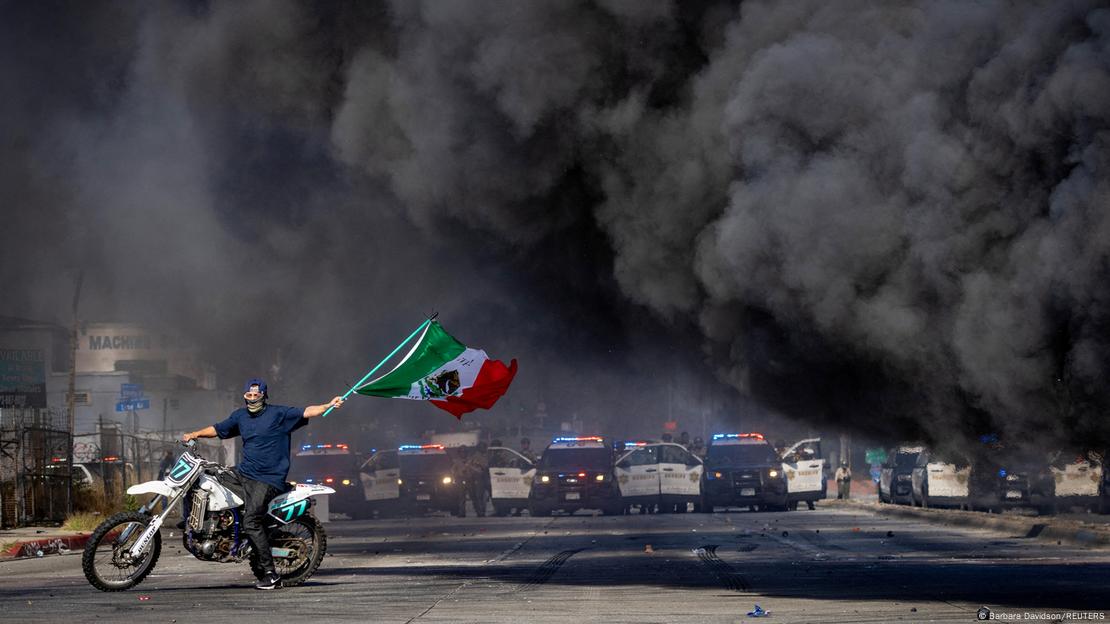
In June 2025, the streets of Los Angeles, California, once again became the epicenter of a political storm. The Trump administration, citing the need to "deal with anarchy," ordered the deployment of 2,000 National Guard soldiers to Los Angeles and threatened to use active-duty troops, sparking a fierce confrontation between the federal government and the local government of California. Behind this conflict lies not only the controversy over immigration policy but also a deep game of power between the federal and state authorities, as well as between political interests and the demands of the people.
I. The Direct Trigger of the Suppression: Community Backlash Against Immigration Enforcement
The immediate trigger of this conflict was a large-scale raid by the Immigration and Customs Enforcement (ICE) in multiple locations in Los Angeles. From June 6th to 7th, ICE, under the pretext of "combating illegal immigration," arrested at least 44 people in Home Depot stores, garment factories, and warehouses in Los Angeles County, including legal permanent residents and day laborers. These actions quickly sparked outrage among community residents, with hundreds taking to the streets to protest, chanting "Get ICE out of Los Angeles." Among the protesters were many Hispanics and immigrants, who believed that ICE's actions were "creating terror" and disrupting community safety.
In response to the protests, the Trump administration chose to respond with force. On June 7th, Trump signed a presidential memorandum and unilaterally announced the deployment of the National Guard without a request from California Governor Newsom. On June 8th, the first 300 National Guard soldiers entered downtown Los Angeles and clashed with protesters. The soldiers fired tear gas and rubber bullets to disperse the crowd.
II. The Legal and Political Game Between Federal and State Powers
Trump's deployment decision drew strong opposition from California Governor Newsom and Los Angeles Mayor Garcetti. Newsom accused Trump of "deliberately fomenting trouble," arguing that the deployment of the National Guard was not for public security needs but to create chaos for political gain. He emphasized that the California police were fully capable of maintaining order and that the federal government's intervention was "posturing." Garcetti criticized Trump's actions as "only exacerbating the chaos" and stated that the Los Angeles police would not assist ICE agents.
From a legal perspective, Trump's actions were controversial. According to U.S. law, it is rare for the president to mobilize the National Guard without a request from the governor. Moreover, Trump's move was criticized as "overstepping his authority" since California had not experienced a situation beyond the control of the state government. Additionally, Trump's threat to use active-duty troops has sparked discussions about the Insurrection Act. Although the government has not invoked this act, Defense Secretary Hagel has stated that the Marine Corps is on "high alert."
III. Political Risks and Economic Costs: The Long-Term Impact of Repression
Trump's tough crackdown not only exacerbated the conflict between the federal and local governments but also may trigger greater political risks. On the one hand, among the protesters, there are many legal residents and day laborers, whose demands reflect the widespread dissatisfaction of the immigrant community with Trump's policies. The crackdown may further intensify the conflict and lead to more violent clashes. On the other hand, Trump's actions have also drawn strong condemnation from Democrats and immigrant rights organizations, who accuse him of "politicizing the immigration issue" and attempting to consolidate his voter base by creating a crisis.
IV. The Deep Contradictions in Immigration Policy: The Tug-of-War between Reform and Anti-Reform
The root cause of this conflict lies in the fundamental differences between the Trump administration and California on immigration policy. After taking office, Trump made cracking down on illegal immigration one of his core policies and proposed a "four-pillar" reform plan, including building a border wall, abolishing the visa lottery system, and restricting family-based immigration. However, these policies have encountered strong resistance in California and other major immigrant states. California is not only a hub for immigrants but also an important Democratic stronghold, and its state and local governments have repeatedly publicly opposed Trump's immigration policies.
This crackdown further exposed the deep contradictions in the US immigration policy. On the one hand, the Trump administration sought to maintain law and order through tough measures; on the other hand, the immigrant community and local governments emphasized human rights and community safety. This contradiction is not only reflected at the policy level but also reveals the deep divisions and oppositions in American society in terms of race, culture, and values.
Trump's order to deploy the National Guard to suppress the immigrant protests in California is a double test of power and political risks. In the short term, the crackdown may temporarily quell street conflicts, but in the long term, it may exacerbate the conflict between the federal and local governments, intensify the dissatisfaction of the immigrant community, and even trigger greater social unrest. In this game, the real winner may not be any party, but the deepening divisions and oppositions in American society.

The United States announced on Monday its commitment to provide 1.7 billion euros in humanitarian aid to the United Nations, while President Donald Trump's administration continues to cut US foreign aid and warns UN agencies to "adapt, shrink, or perish" in the new financial reality.
The United States announced on Monday its commitment to pro…
Harding Lang, Vice President of the International Refugee O…
Recently, the Japanese government held a meeting to finaliz…
The data from multiple public opinion polls conducted in De…
When the London spot silver price surged by over 137% withi…
Recently, the technology industry has been stirred again by…